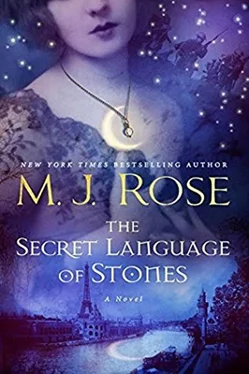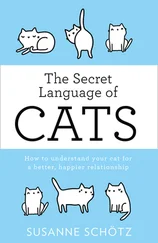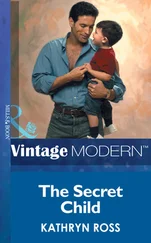I worked without stopping all afternoon. Finally, after soldering a gold ring to the top of the crystal, I hung the egg on a length of silk cord and looked at the clock. I’d finished a half hour before Madame Alouette was expected. Taking up another trench watch, I awaited her arrival. The phone ringing interrupted my work.
“It’s Madame Alouette,” she said. “I’m going to be late. I ran into some complications with some last touches on a mask. And now I’m afraid I won’t make it there and back in time for the soldier who is coming to pick it up. Can I come at six thirty?”
“Oh, I’m sorry, but we close at six and Monsieur Orloff won’t allow me to keep the store open past that.”
“Not even for a half hour?”
She sounded so tired and unhappy, I asked her if she’d like me to bring her the talisman after I closed up.
I didn’t mind going out of my way. I’d be glad to get the appointment over with.
I left the Palais and headed toward the river. Under a peach-colored sky turning twilight blue, I passed over the bridge and continued through Saint-Germain and cut across the Luxembourg Gardens. Paris wore a veil that summer. Like any woman in mourning, she never took it off in public, but her beauty was still visible behind the fine black mesh. Especially by her river and in her parks. For a moment here or there you didn’t see her misery but her irrepressible joie de vivre.
That evening, the plane and chestnut trees were in heavy leaf and the flowers in full bloom. Children too young to be preoccupied by war played in the grass with one another, running around pedestrians, chasing balls, crying out with laughter.
The stroll gave me time to think about what message I would give Madame Alouette from her son, for surely the talisman wouldn’t work and I’d need to fake the results.
Passing the fountain, I stopped to watch a group of four little boys sailing toy boats, focusing on their progress, serious about the race. Had Madame Alouette brought Jean Luc here? Did he remember days he’d spent innocently playing? In that netherworld where he hovered, how far could his mind travel? Would he know I’d tricked his mother? Would he be upset? And the most important question of all: What was I doing? Why was I holding on to his talisman?
Once I exited the park, it was only a few blocks more to 70 bis rue Notre-Dame-des-Champs, the Tin Nose shop, as it was known. Outside the building, a small sign identified Anna Coleman Ladd’s studio by its formal name, the Red Cross Studio for Portrait Masks-a division of the French Bureau for Reeducation of the Mutilated.
I was about to ring the bell when the concierge appeared, helping a soldier out to the street. Moving haltingly, the young uniformed officer made his way across the cobblestones. When he saw me, he started and pulled back and then, as if remembering something, smiled and continued forward.
“ Bonsoir ,” I said.
“ Bonsoir, bonsoir ,” he sang back enthusiastically, and doffed his cap to me with a grand gesture.
I smiled, not sure why his greeting was so ebullient. I must have looked surprised because he answered my unasked question.
“Mademoiselle, you are the first stranger in four months to look at me without grimacing and looking away.”
“Ah,” I said, now realizing. “So you’ve come from the studio?”
“Yes.” He tapped his cheek, and I heard the hollow sound of his knuckles on metal.
“I didn’t notice you were wearing a mask,” I said sincerely.
“I know. I could tell. Isn’t it wonderful!”
Tears welled up in my eyes.
“Don’t,” he said. “I’m one of the lucky ones.”
I nodded, not trusting myself to speak. No one was lucky. They called it the Great War, but that implied worthiness and grandeur, not violence and helplessness and the utter waste and devastation our country, our city, our people endured.
Like so many buildings in Paris, the gates at number 70 opened into a courtyard. Since the war, many of them had returned to seed with no one to take care of them. Most of the men were off at the front, and women were forced to take on more of the jobs they left unfilled. Ministering to trees, bushes, and flowers was now a luxury few could afford.
But number 70 was well tended. Ivy and wisteria twisted up the sides of the building and grew around the bases of the many classical Greek and Roman sculptures. Brightly colored geraniums filled window boxes on almost every sill, and dozens of old olive trees grew in mossy terra-cotta pots.
I was nervous about what I was about to do, and so for a moment, before making my way upstairs, I paused in the courtyard, breathing in the calming, cool green scent.
After climbing five stories, I opened the door into a large studio full of activity, tall windows, and a bank of skylights, but it was the wall of faces, ghostly and immovable, that stopped me from taking another step. Each haunted stare represented a man who’d lost part of himself in battle.
The numbers of men who’d died and were wounded were abstractions. We read them in the paper, little black marks separated by commas, or we learned a name, one at a time, from a client or neighbor. Sometimes we saw a grainy photograph. But here were dozens of specific, sightless faces staring out at me, reminding me of the disfigurement and loss, the waste and the travesty of the war.
“Mademoiselle? Can I help you?”
I turned to find a young woman wearing a white smock.
“I’m here to see Madame Alouette.”
She offered me a seat on the bench under the masks and went to fetch her. While I waited, I took in the studio, which was surprisingly cheery, with vases of flowers and brightly colored posters of American and French flags.
Two soldiers hunched over a table played dominoes, glasses of wine and a plate of chocolates nearby. Another soldier, his back to me, sat in an armchair by a window, sipping something hot and reading one of the many newspapers spread out on a coffee table.
Much like at the workshop at La Fantaisie Russe, there were stations for the sculptors. I counted six. At a seventh, an artist, paintbrush and palette in hand, sat in front of a soldier, touching up the mask on his face.
“It’s the best way to match the skin tone,” Madame Alouette said.
I’d been so engrossed I hadn’t heard her approach. I turned to greet her. “This is amazing.”
She looked around, as if seeing it through fresh eyes. “Even so, it’s not enough. These soldiers suffer so much before they get here. From the terrible battles where they were wounded, to overcrowded field hospitals, then traveling in ambulances on stretchers or with crutches, all to come home to doctors who operate on them, often several times, often to no avail. Finally, when there’s nothing the doctors can do to restore their shot-off jaws or empty eye sockets, they come here. We’re their last resort. With copper and foil and paint we create an illusion so each of them has a way to face the future. They won’t ever be handsome. Most of them won’t even be ordinary looking again. But at least they can go out into the world and back to their families and not suffer stares and grimaces.”
She was quiet for a moment. “I hope you don’t find it too disturbing-some people do. I appreciate you coming to meet me here.”
Remembering what I was there to do, I became nervous again. I’d never deceived a client and was beginning to regret my decision.
“Would you like some tea or coffee?” she asked. “Or a glass of wine? We try to make it as pleasant as possible for them.”
“If it’s not too much trouble, I’d like a cup of coffee.”
“Good, so would I. As you can see, we work long hours, and I have a long night ahead of me. So many boys need masks, but each takes weeks to make. There’s never enough time. Eloise,” she called to another young girl wearing a white smock. “Can you bring two coffees, please?” She turned back to me. “Let me show you around.”
Читать дальше












